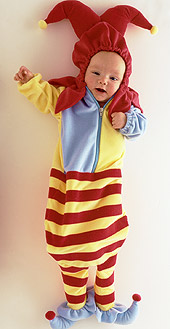 |
SECTION 1 |
| OVERVIEW |
DEP 5068-01 SPRING 2013
 |
SECTION 1 |
|
|
|
|
|
|
|
|
|
|
More information will be provided on
each assignment as the semester progresses.
We have a diverse set of individual and
team-based assignments designed to further your understanding of course
material. All are relatively short, are in-class, and spaced throughout
the entire semester.
There will be a practice quiz.
![]() [1]
There will be THREE Team Based quizzes, each at the start of a major
unit: (1) Early Childhood, (2) Adolescence and (2) Young Adulthood.
[1]
There will be THREE Team Based quizzes, each at the start of a major
unit: (1) Early Childhood, (2) Adolescence and (2) Young Adulthood.
First you will take the quiz individually in class, and then retake it with your team during class. Both individual and team scores will be scored for each quiz (for a total of 30 points per quiz).
Quizzes are scheduled for: January 29, February 21, and March 19.
I will only count
the scores from the two highest quizzes. (If you miss a quiz, I will
use your two scores.)
Total toward
grade = 25%
![]() [2]
There will be THREE in-class Team Based small projects. All three
projects will be done in class. In each case your team will complete
a form for the following:
[2]
There will be THREE in-class Team Based small projects. All three
projects will be done in class. In each case your team will complete
a form for the following:
Analysis of interaction video for middle childhood (counts toward FEAP, see below) February 14
Analysis of learning theories application video (counts toward FEAP, see below) March 26
Problem solving: Housing decision for the elderly April 18
I will only count the scores from the two highest projects.
Total toward grade = 25%
Total toward grade = 5%
Total toward grade = 20%
Total toward grade
= 25%
|
|
We will use Larry Michaelsen's Team Based Learning or TBL for several course assignments (see Michaelsen, L.K., Knight, A. B., and Fink, L.D. [2002]. Team Based Learning, Stylus Pubs., Sterling, VA ). These assignments and grades will reflect team performance. All team work projects will occur in class.
Michaelsen has found that students using TBL typically learn the material better than those doing only individual projects. Each student has academic strengths and weaknesses that are improved through team membership. This has been my experience as well, especially on quizzes.
Some students are concerned about freeloaders
on the team or that their grades will suffer in teamwork. I want to reassure
you that in using this
approach over a four year period, there
was only ONE case where a student's individual and team average quiz scores
were tied. In NO CASE
was a student's individual average quiz
score higher than their team's average score. Because team members bring
diverse points of view to
the same topic everyone benefits. Furthermore,
since all TBL occurs during class, there is little opportunity for social
loafing.
Furthermore, virtually every student in
this class later will be part of a team in their future work. Researchers
work at a mix of team and solo projects (and increasingly grant agencies
favor teams in their funding awards). School psychologists, social workers
and clinicians often are part of an evaluation team of a client. Management
personnel frequently work as part of a team. Employers repeatedly stress
that they value team experience in hiring employees.
|
|
Do I pick my team members?
|
IN BLACKBOARD |
|
|
|
|
We will watch the ASSIGNMENT VIDEO in class.
There will be a set of discussion questions. Your team will write up your
answers to the discussion questions on the provided form and turn in your
answers in class.
|
|
We will watch the ASSIGNMENT VIDEO in class.
There will be a set of discussion questions. Your team will write up your
answers to the discussion questions on the provided form and turn in your
answers in class.
|
|
We will discuss a housing decision to be
made for an elderly person in class. Each team will receive a set of parameters
describing this senior citizen's situation. Your team will write
up your answers to the discussion questions on the provided form and turn
in your answers in class.
|
|
This reflective paper is your final assignment for Lifespan Development. It is due May 1st by NOON, hard copy in my EPLS mailbox.. Your paper should be no longer than the equivalent of 5 double spaced typed pages (approximately Times New Roman 12 font). Draw on course readings (including lecture Guides) as well as literature in your substantive area. (Please include a bibliographic section--which doesn't count in the 5 pages--for any literature that you cite.)
FIRST, select an age period from among these seven: infancy; early childhood; middle childhood; adolescence; early adulthood; middle adulthood; or late adulthood that you believe is relevant to your future career or research interests (or perhaps simply that you find more interesting than others).
SECOND, why does that particular period interest you the most? Alternatively, how does this period figure in your future career and/or research interests? For example, do you plan to teach, or do counseling (including career counseling) or therapy with this age group? Have you had experience working with this age group?
THIRD, describe what you see to be as the most salient features (physical; cognitive; social) of that age period. What do you see as particular strengths and weaknesses of this age period?
FOURTH, how do the features of this age group relate to your interest in them (e.g., as students or therapists)?
FIFTH, consider the features you described
in Question 3 above. How much do you believe these features are genuinely
developmental, culturally bound, or reflect particular generational experiences
(or any combination of these three)?
|
|
Please see the Presentation page for more detailed information.
Each student will do a 15-20 minute Power Point presentation on a topic related to Lifespan Development. It may be either an individual presentation or with a group that you select. I will need a brief description of the topic of your presentation, whether you will work in a group with the names of group members if applicable, and a selected date on February 28th.
*more on "counts toward
FEAP". So...what's FEAP?
|
|
"FEAP" is short for "Florida Educators Accomplished Practices, Indicators and Tasks". It is a mandate from the state of Florida that those associated with education in particular Florida jobs be able to display certain competencies, which are assigned to different courses. In this particular case, the competencies for our course are familiarity with technology applications (in education, but obviously in other areas) and being able to apply different learning theories to stages of development and education. We will do so in different ways.
One way, of course, is our course materials,
which include Blackboard, websites, Power Point, and poster or presentation
creation (using Power Point, video, etc). Another is through the Team Based
projects and the individual reflective paper.
| OVERVIEW |
|
 |
This page was built with
Netscape Composer.
Susan Carol Losh January
3 2013
